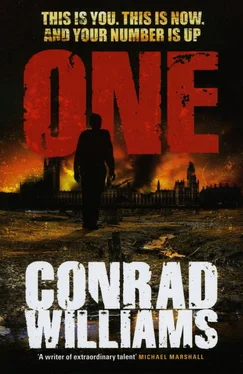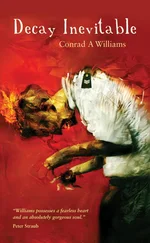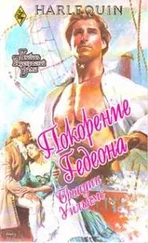He was turning to leave when someone called out, asking about the others.
‘What others?’ Jane asked.
‘There’s more of us,’ the voice called. ‘In the crossover passages at City Road. The old disused station.’
‘Can’t you pass it on?’
‘You pass it on, pal. It’s your job. We’re leaving.’
Jane stood on the platform as roughly two-thirds of the platform dwellers hastily packed up their things and streamed by him. One or two shook his hand and thanked him. A man wearing a trilby over a mass of sweaty rat-tails told him he should get going himself and fuck the City Roaders or he’d end up being the last pretzel in the Skinners’ snack bowl.
He watched their backs fade through the exit, heard them swearing and stomping and splashing up the escalators. About twenty men remained. Already they were repositioning their gear, seemingly happy with the grand space they had inherited.
‘Fucking mugs, the lot of them,’ White Beard said. ‘Fucking raft? Who’d go out on the sea? I’ll take my chances with the Smoke. My grandad lived here in the Blitz. Didn’t get a fucking scratch.’
Jane loped down to the end of the platform and squinted into the tunnel’s throat. A constant breeze shifted his hair, chilled the flesh of his arms. It was like the final protracted breath of a giant. It carried every scent you could associate with death upon it. It was a stew of bad things, dirty water run from the tap leading directly to the well of your nightmares.
He dropped down into the gulley of sewage and allowed himself to be swallowed.
It wasn’t far to the defunct City Road section of the Northern Line tunnel but Jane’s constant stumbling on the rails and the fragments of wall collapsing into the passageway lengthened his journey considerably. There were no platforms at the station any more, but candles had been left here too, lighting the way to the passage arches, seemingly hanging in the wall, five feet above the floor. Soot clung to every surface; it was as if everything had been carved from it. The floor seemed to shiver as he hauled himself up from the rails; his hands sank into inches of soft matter. Dead cables slinked around him, hanging from their routers like snakes sleeping in branches, roughly following the shape of the architecture as though they were its preliminary pencil sketches.
Jane called out but his voice died immediately in the granular acoustics. Pieces of unrecognisable machinery lay by the tracks. A dust-veiled sign from the 1940s warned people not to leave their belongings behind after the all-clear. He saw a figure at the central corridor leading to the stairs. A child holding a toy, a stuffed animal. It looked like a lion. The slight figure was wearing pyjamas. He was barefoot. Jane’s heart lurched as if it were making a break for freedom. He almost laughed out loud.
‘Stanley?’ he called.
The figure instantly turned and ran away, as if it had been waiting only for Jane’s voice to trigger it. Jane stood in the passageway staring at the skirls of dust the figure had kicked up at the moment of its exit. Not Stanley. Stanley would not be five years old still. Stanley would be wearing a scowl and a hoodie and bumfluff on his upper lip. Stanley would not run away. He’d stand his ground and ask Jane, ‘What’s it to you, fuckhead?’
Jane took off after him.
He managed a couple of flights before the walls started to move. Figures detached themselves from the murk as if they had animated themselves from the soot. Soon he found himself trying to move through a corridor packed with black flaking bodies. He couldn’t think beyond the character of Pigpen in Peanuts , who seemed to be constructed from dirt. All he could see were wild white eyes and teeth; a smell of humus and brackish water. It was as if the shored-up earth, failing now, deep beneath the capital, was shedding ghosts at every turn.
‘Stanley?’ he called out again, a reflex that he seemed to have no power over. When it came to his son, those moments when he felt close to Stanley, either during these mirages or in dreams, it was as if he could not rein in his excitement. It could only be a memory, or a wish, but the ever-hopeful part of his brain lit up, burning so brightly that no other function could be considered.
Now he had reached the ancient locked-in ticket barrier. How long had this station been closed to the public? A good seventy years, surely. People were huddled together under their shifting blanket of dust as though resigned to death. Jane imagined them never moving, just sitting, waiting, waiting for a moment such as this, a person to release them from a stasis they had not noticed arriving and did not know how to shake off. They looked at him with a mixture of puzzlement and relief.
Jane told them about the raft. He said they would have to go back through the tunnels because these doors had been locked so long they might well have sealed themselves shut. They stood and applauded him, and he began to cry, surrounded by shades, all of them weeping with gratitude, all of them missing somebody. Everyone was the same. Everyone sought solace of one kind or another.
He looked around for Stanley as they filed past him, but he knew there would be nobody here who reminded him of his son. He had seen a ghost, that was all, a bruise in his memory. Stanley was still with him, in one way or another. There was no point in getting excited every time it happened. It was just his way of saying hi. It was the son in his blood. He would never leave him to be on his own.
But then he saw him again a couple of hours later. A little boy, in blue-striped pyjamas plated with dry mud. A soft toy clutched in one hand. Hair mussed as if he’d just got out of bed. He was running along Primrose Hill Road, just north of Regent’s Park, legs barely bending as he ran, leaning over so far it seemed he must trip and fall headlong, just the way that Stanley ran when he saw his dad approaching the house from a long shift on the rigs. Jane pursued. It could not be Stanley. Stanley had not been trapped at the age of five all this time. It didn’t matter. The child still needed to be taken care of.
He lost sight of the boy as he reached Albert Road. One moment he’d been there – Jane was sure he wasn’t aware that he was being followed, he hadn’t seen his head turn, he would have loved to glimpse the face, just to convince the old romantic, the gullible sap wishing for the impossible, in him – the next moment he was gone. There were plenty of hiding places. Jane didn’t know where to start. He could be looking for him for an hour and the boy would be on the south side of the park, heading down Portland Place.
Jane crossed the road and nipped through the park’s exterior to the Outer Circle where the main entrance to London Zoo was located. He walked straight through the open gates. In. Pass on the details. Out. Job done. On to the next and then find Becky and scram.
He marched along the zoo’s paths trying to work out where everyone would be congregating. Every cage he walked past bore a sign that had been burned clean of information. Sometimes there was a body, an animal carcass beyond identification, trapped inside the bars, passed unsuitable for Skinner invasion or devourment. More often than not the cages were empty, whatever had lived within having bent the bars open in order to escape, once consumed by their Skinner hijacker. Behind him the great nets of the Snowdon aviary had collapsed; scorched patches of it lay flapping around like failed spiders’ webs. Cairns of dried shit were the only pointer to any kind of animal habitation now. Jane wondered where they had all gone.
He checked the vivarium and aquarium, but both were empty, their glass tanks smashed, the animals within now gone, perhaps taken for food. He headed south-east, towards a shattered fountain, past areas where African birds had been kept, pygmy hippos, bearded pigs. He dug in his memory for what these creatures looked like.
Читать дальше












